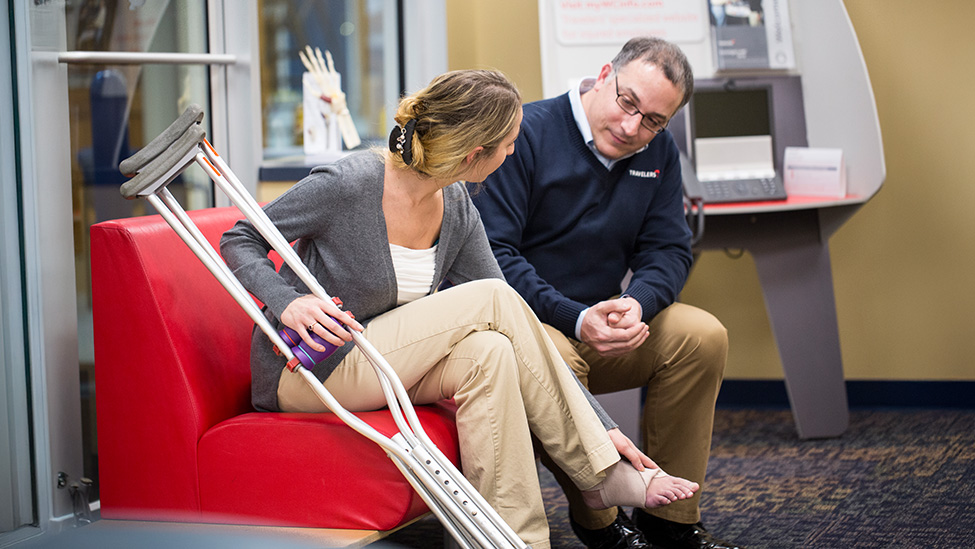Safety & Health

Highlight
>36,000
Analyses on ~20,000 samples performed by the Travelers Industrial Hygiene Laboratory annually
As an employer, we’re committed to the safety, health and well-being of our more than 30,000 employees – our most valuable asset. And as an insurer, we are in the business of improving the safety, health and well-being of our customers and our communities, from helping to reduce distracted driving to working with business customers to prevent and minimize the severity of workplace injuries.
Approach
At Travelers, our success relies on the safety, health and well-being of our employees. Our workers compensation customers also trust us to help protect their most precious resource – their employees. This combined responsibility makes safety and health both a key driver of our sustained value creation and an opportunity to positively impact our communities more broadly.
Protecting the safety and health of our employees
At Travelers, our employees are our most valuable asset, and we are committed to helping them be safe, healthy and productive in their lives and at work. To nurture a culture of safety, we outline our expectations in safety policies, regularly evaluate health risks, conduct incident root cause analyses and develop programs to mitigate safety risks for our employees. We provide onboarding training, which includes workstation ergonomics and driver safety. We also provide targeted training for our employees who drive regularly for work or visit potentially hazardous environments, such as construction sites or disaster areas.
We regularly survey our owned and leased facilities to check for and mitigate potential hazards. In addition, our company fleet vehicles are equipped with advanced safety features, including forward-collision warning systems and automatic emergency braking, to help keep our employees safe on the road. Our investments in drones also help keep our employees safe by reducing the need for them to engage in potentially hazardous activities, such as climbing onto ladders and roofs. We also offer our employees office workstation ergonomics consultation services and self-help ergonomic tools and training.
As discussed in further detail under Business Resiliency, Travelers’ Incident Management Operating Model includes three teams: the Executive Crisis Management Team (ECMT), the Enterprise Event Response Team (EERT) and the Operational Response Team (ORT). These teams are tasked with overseeing and responding to incidents and emergency situations consistent with our event-specific playbooks. Our corporate pandemic plan, for example, outlines our strategy for maintaining a safe and healthy workplace while continuing to deliver uninterrupted service to our customers, agents and brokers.
Beyond working to ensure the work-related health and safety of our employees, we offer comprehensive benefit programs to help our employees be healthy and productive in all aspects of their lives. In 2024, in keeping with our culture of wellness, we continued to promote our extensive mental, physical and financial wellness resources, including those focused on reducing stress, remaining active and planning for financial security. To learn more about the comprehensive benefit programs we offer to our employees, see Total Rewards on the Human Capital Management section of this site.
Protecting the safety and health of our customers’ employees and our communities
As a leading workers compensation carrier, we share our risk control expertise, as well as our claim and medical data and analytic insights, with our customers and our agent and broker partners. Our Underwriting and Risk Control departments provide information to customers to help promote a safe workplace and identify and mitigate hazards. When claims do happen, our Claim and medical professionals quickly deliver appropriate resources to help the injured employee achieve optimal claim and medical outcomes and return to work as soon as medically appropriate. These resources include, among others, our interactive workers compensation claim portal, MyTravelers® for Injured Employees.
Our team of more than 600 Risk Control professionals helps our Business Insurance customers address exposures to loss and prevent injuries through our resources regarding employee safety, ergonomics, industrial hygiene, driving safety and property preservation, among others. We conduct approximately 124,000 customer engagements per year through on-site surveys, on-demand risk evaluations, virtual risk assessments, jurisdictional inspections, trainings and online self-help resources. With one of the largest Risk Control departments in the industry, we have the experience and scale to provide our customers with the right resource at the right time.
We believe the insurance industry should also play an active role in promoting safety in our communities. That’s why we provide extensive safety resources to customers and the public through the Prepare & Prevent section of our website, which we amplify with outreach through traditional and social media strategies.
In addition, the Travelers Institute, our public policy division, promotes safe behaviors. For example, the Travelers Institute helps combat distracted driving through its Every Second Matters® education campaign, and in 2024, it hosted webinars focused on employee health and safety through the Wednesdays with Woodward® series. These webinars included:
- Resilience and Hope: Geralyn Ritter’s Story of Survival
- How Technology Innovations Are Improving Distracted Driving Data and Advancing Safety
- Fit for Success: Unlocking Health and Performance
The Travelers Institute also hosted a half-day symposium in Denver, Colorado, titled Leading Your Business into 2025: Navigating the Economy, Public Policy and Worker Mental Health, as a part of the Forces at WorkSM initiative. The symposium featured a keynote address and panel discussion that explored the state of worker mental health and provided a framework for understanding mental health as a continuum.
More about safety & health
Safety awareness & culture
Travelers Workforce Advantage® is our comprehensive approach to helping our Business Insurance customers manage employee safety.
Industrial Hygiene Laboratory
Our Industrial Hygiene Laboratory, located within our Claim University campus in Connecticut, provides specialized services to our business customers to help them assess employee exposures to potentially harmful environments and work toward the prevention of occupational illnesses.
Ergonomics consulting services
Our ergonomics specialists focus on helping customers identify and reduce ergonomic risk factors in the workplace.
Transportation safety
Travelers Risk Control transportation specialists help customers understand auto risk while providing effective fleet risk management solutions to businesses with commercial auto fleets.
Fire & life safety
Travelers Risk Control fire protection specialists and consultants evaluate fire hazards and protection systems, helping customers protect property, life and business.
Enhancing the experience of injured employees
Travelers takes a biopsychosocial approach to employee recovery, identifying and addressing the many factors that may impact recovery after an injury or illness.
Preventing chronic pain & potential opioid use
Our programs, which help injured employees while reducing Travelers’ opioid-related claim costs, illustrate the shared value we create for our customers, their employees, our communities and our shareholders.
Illustrative initiatives
Travelers Medical Capabilities
ConciergeCLAIM® Nurse: Helping Injured Employees Return to Work

Travelers Medical Capabilities
MyTravelers®: Secure and Convenient Access from Anywhere

Travelers Institute®
Forces at WorkSM Initiative
